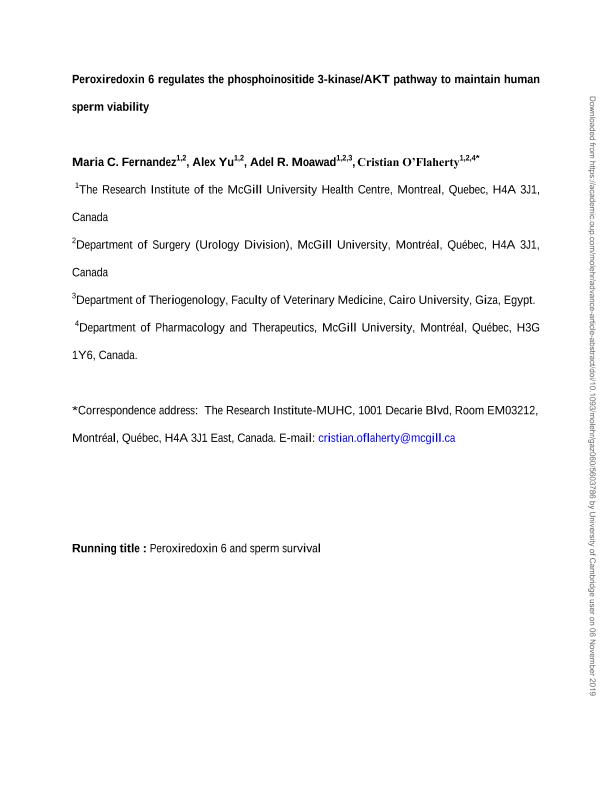Mostrar el registro sencillo del ítem
dc.contributor.author
Fernández, María Celia

dc.contributor.author
Yu, Alex
dc.contributor.author
Moawad, Adel R.
dc.contributor.author
O’Flaherty, Cristian
dc.date.available
2022-02-04T19:23:12Z
dc.date.issued
2019-10
dc.identifier.citation
Fernández, María Celia; Yu, Alex; Moawad, Adel R.; O’Flaherty, Cristian; Peroxiredoxin 6 regulates the phosphoinositide 3-kinase/AKT pathway to maintain human sperm viability; Oxford University Press; Molecular Human Reproduction; 25; 12; 10-2019; 787-796
dc.identifier.issn
1360-9947
dc.identifier.uri
http://hdl.handle.net/11336/151396
dc.description.abstract
Peroxiredoxins (PRDXs) are antioxidant enzymes proven to control the levels of reactive oxygen species (ROS) and to avoid oxidative damage in the spermatozoon. Previously, we have shown that low amounts of PRDXs are associated with male infertility and that PRDX6 is the primary antioxidant defense in human spermatozoa, maintaining survival and DNA integrity (Gong et al., 2012, Fernandez and O’Flaherty, 2018). Oxidative stress can trigger different pathway cascades in the spermatozoa, including truncated apoptosis. It has been reported that the phosphorylation status of phosphoinositide 3-kinase (PI3K) and its target AKT (protein kinase B) prevent the spermatozoon from entering the truncated apoptotic cascade. Here, we aim to study the regulation of the PI3K/AKT pathway by PRDX6 and assess its role in maintaining sperm viability. Human semen samples were obtained over 1 year from 20 healthy non-smoking volunteers aged 22–30 years. Sperm viability, lipid peroxidation and apoptosis-like changes were determined by flow cytometry while phosphorylation of PI3K and AKT substrates were assessed by immunoblotting using anti-phospho-PI3K and anti-phospho-AKT substrates antibodies. We found that the addition of arachidonic acid and lysophosphatidic acid, products of PRDX6 calcium-independent phospholipase A2 (Ca2+-iPLA2), prevented loss of sperm viability and maintained the phosphorylation of PI3K. Antioxidant compounds such as D-penicillamine partially prevented the oxidative damage on spermatozoa that led to a reduction of their viability. Thus, other pathways can also participate in sperm survival and be regulated by PRDXs. In conclusion, PRDX6 contributes to the regulation of ROS production and the PI3K/AKT pathway for the maintenance of sperm survival.
dc.format
application/pdf
dc.language.iso
eng
dc.publisher
Oxford University Press

dc.rights
info:eu-repo/semantics/openAccess
dc.rights.uri
https://creativecommons.org/licenses/by-nc-sa/2.5/ar/
dc.subject
AKT-SUBSTRATES
dc.subject
APOPTOTIC-LIKE CHANGES
dc.subject
ARACHIDONIC ACID
dc.subject
LYSOPHOSPHATIDIC ACID
dc.subject
OXIDATIVE STRESS
dc.subject
PEROXIREDOXINS
dc.subject
PI3 KINASE
dc.subject
SPERM VIABILITY
dc.subject.classification
Biología Reproductiva

dc.subject.classification
Ciencias Biológicas

dc.subject.classification
CIENCIAS NATURALES Y EXACTAS

dc.title
Peroxiredoxin 6 regulates the phosphoinositide 3-kinase/AKT pathway to maintain human sperm viability
dc.type
info:eu-repo/semantics/article
dc.type
info:ar-repo/semantics/artículo
dc.type
info:eu-repo/semantics/publishedVersion
dc.date.updated
2020-11-06T20:26:25Z
dc.journal.volume
25
dc.journal.number
12
dc.journal.pagination
787-796
dc.journal.pais
Reino Unido

dc.journal.ciudad
Oxford
dc.description.fil
Fil: Fernández, María Celia. McGill University; Canadá. Consejo Nacional de Investigaciones Científicas y Técnicas. Oficina de Coordinación Administrativa Parque Centenario. Centro de Investigaciones Endocrinológicas "Dr. César Bergada". Gobierno de la Ciudad de Buenos Aires. Centro de Investigaciones Endocrinológicas "Dr. César Bergada". Fundación de Endocrinología Infantil. Centro de Investigaciones Endocrinológicas "Dr. César Bergada"; Argentina
dc.description.fil
Fil: Yu, Alex. McGill University; Canadá
dc.description.fil
Fil: Moawad, Adel R.. McGill University; Canadá. Cairo University; Egipto
dc.description.fil
Fil: O’Flaherty, Cristian. McGill University; Canadá
dc.journal.title
Molecular Human Reproduction
dc.relation.alternativeid
info:eu-repo/semantics/altIdentifier/url/https://academic.oup.com/molehr/advance-article/doi/10.1093/molehr/gaz060/5603786
dc.relation.alternativeid
info:eu-repo/semantics/altIdentifier/doi/http://dx.doi.org/10.1093/molehr/gaz060
Archivos asociados
